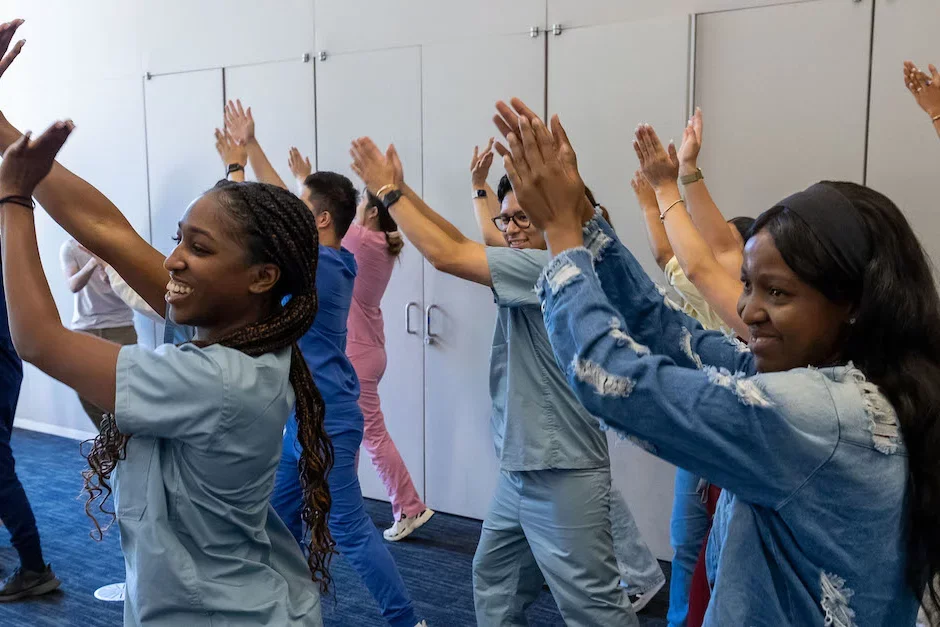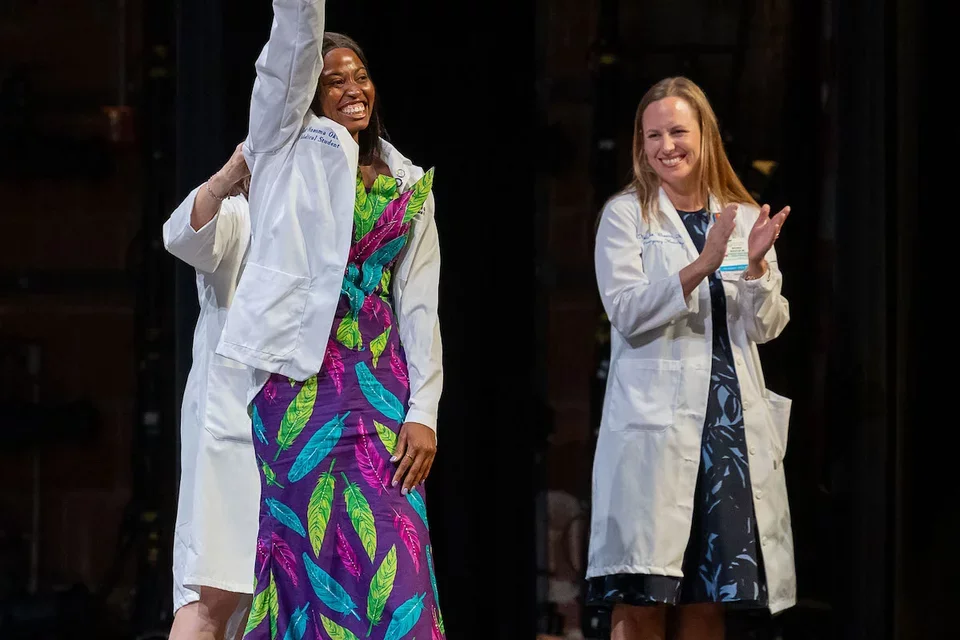New Medical Students Bond During DGSOM's Month-Long Orientation

It’s Monday, August 14, a sunny Southern California day that could easily blend in with all the others. For the David Geffen School of Medicine at UCLA (DGSOM) class of 2027, it’s unforgettable—monumental.
It’s their first day of medical school.
All together for the first time, the incoming class filled a temperature-controlled lecture hall with an atmosphere of significance and transformation. They’d reached a milestone by getting into a top medical school and were now beginning the next phase of their journey.
“My aspiration for all of you is to be leaders,” said UCLA Health Sciences Vice Chancellor John C. Mazziotta, MD, PhD. “Be a thermostat not a thermometer. Set the climate for change, don’t just monitor it.”
The students could visualize the road to health leadership more clearly than ever, and it started with Base Camp.
Named after the hubs that help mountaineers and explorers launch successful expeditions, Base Camp, DGSOM’s month-long orientation course, helps new medical students launch value-grounded training careers.
“Medical school is very fast-paced,” says Natasha Wheaton, MD, DGSOM’s Assistant Dean for curricular affairs and a key architect of Base Camp.
“That’s why it’s important to have a month to do all the things you might do at any base camp, such as getting to know your new surroundings and your new team.”
DGSOM’s Base Camp, part of the new Heals curriculum that launched in 2021, covers foundational topics, including ethics, clinical skills, and social determinants of health. More importantly, it helps students begin building the communities essential to thriving in medical school and in a medical career.
During Base Camp, students don’t only meet, but truly get to know classmates, faculty members, and hospital staff. They explore Los Angeles, the multicultural city that will host and deeply inform their education.
This community focus aligns perfectly with students’ priorities.
“My goals are really just to get to know as many people as possible, and help more people connect with each other so that we build a community,” said first-year student Guillermo Nunez Hernandez.
Hernandez’s new classmates echoed his sentiments.
What are you excited about?
Students had assorted answers to this question, but meeting and getting to know their new community stood out as a common theme.
Explore DGSOM’s Heals Curriculum
An insightful incoming class
The 2023 incoming class possesses varied identities and histories representative of the complex society they operate within and the patients they serve.
“I’m excited about all the different backgrounds that make up UCLA,” Hernandez says. “You can see that it represents a wide range of demographics from a wide range of states.”
DGSOM’s class of 2027 calls 26 states and three countries home. More than 40% of the class identifies as first-generation students.
Dr. Wheaton says she’s amazed by the depth and breadth of this class’s lived experiences and also the richness of their perspectives.
“They have really thoughtful ways of thinking about the world already,” she says. “That really enriches conversations, especially when we start thinking about societal structures and broader questions around medicine.”

A purpose-centered welcome to med school
It’s Tuesday, August 15, the second day of medical school. Future doctors crowd into a sun-drenched lecture room for Base Camp’s Medicine in Society: Our Unhoused Neighbors panel.
The panel, a deep dive into systemic inequities, encapsulates what makes Base Camp unique among medical-school orientations: an emphasis on humanism and big-picture health care concerns.
“Before we jump into the granular aspects of learning medicine, we want students to think about medicine in society, how it interplays with other aspects of society,” says Dr. Wheaton. “We don’t want them to think of medicine as a silo, or that it’s the only thing we do as physicians.”
Base Camp has a strong focus on social racism, health equity, social determinants of health, marginalized and vulnerable communities, and global health care systems. Students don’t simply learn about the concepts; they integrate them into their visions of the doctors they’ll become.
“There’s so much more to being a doctor than just practicing medicine. There’s also an aspect of humanity as well,” says first-year student Jose Segura-Bermudez, underscoring how he and his classmates arrived at medical school committed to healing in ways above and beyond their baseline clinical duties.
To help students distill core values into a guiding vision for their training, Base Camp’s creators thoughtfully placed self-inventories, reflections, and small group discussions throughout the month-long course.
Med Student Life During Base Camp
Students’ self-inventory process involves reflecting on strengths, areas of improvement, and translatable skills from previous roles.
“Base Camp is an opportunity for students to think about applying the skills they already possess to a different set of expectations as they grow into physicians,” says Dr. Wheaton. “Our students are incredible humans and come in with a lot of lived experiences, but they may not have used some skills in the way we’ll ask them to in medical school.”
Early on, students interview each other in the small groups they’ll maintain throughout the pre-clerkship experience. They recognize, in themselves and others, the reflective listening and interview skills so important for patient-physician interactions.
“We want to show them that interviewing a patient is really not that much different from interviewing another human being, and that those basic connections are, essentially, the same thing we leverage in the clinical space.”
Later in the month, students prepare and teach short sessions on any topic they wish except medicine. The activity highlights existing educator skills and also developmental priorities.
“The activity focuses on the teaching skills they’ll need to be effective both as academic faculty and physicians teaching patients about conditions and treatment options, but it also helps the students get to know each other,” Dr. Wheaton says, adding that many students lecture on personal topics, including family recipes, favorite sports, and games unique to their home countries.

Embracing the future, together
Base Camp culminates with the White Coat Ceremony, where medical students first put on their physicians’ coats. Wearing the coat, a symbol of the power and privilege to heal, invokes a gravitas captured perfectly by the oath students recite during the event, as they have since DGSOM’s first White Coat Ceremony in 1995.
“Today I begin my training to become a physician; a noble profession dedicated to the preservation of life and prevention of human suffering. From this day forward I will be different, recognized as a healer. I pledge myself to the value of human life.”
Wearing their white coats while surrounded by a budding community, the new class savored this moment of anticipation and reflection before beginning the rigorous coursework and clinical training that will characterize their next few years.
They cheered each other on. They used newly bestowed nicknames. They’d bonded throughout Base Camp.
The evident camaraderie between classmates, practically strangers one month before, delighted Dr. Wheaton.
“I feel privileged to be involved with Base Camp and to be there with students in a pivotal moment in their career,” she says.
“It’s one of those experiences that brings me joy as an educator.”



